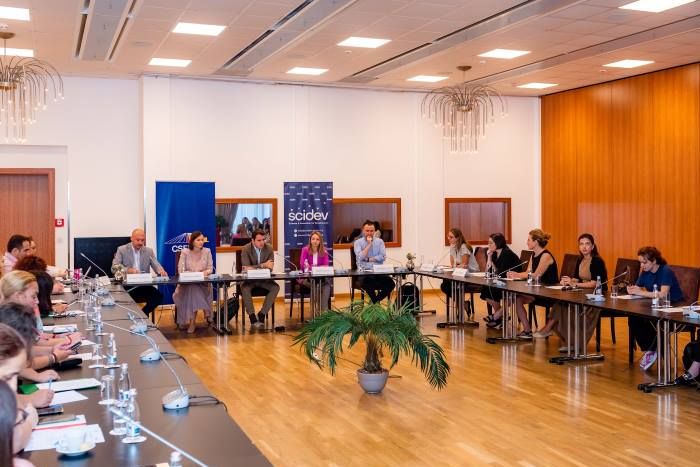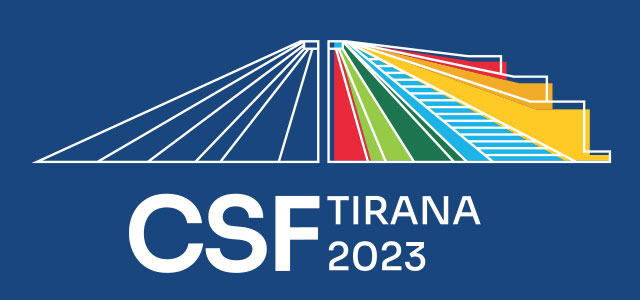| Rezar Balla

On September 28, 2023, SCiDEV organized the public event in hybrid format in Tirana bringing together civil society organizations and stakeholders, emphasizing the urgency of leveraging regional mobility and stimulating innovation through sustained investments for economic growth and societal resilience.
Over three months in the summer of 2023, SCiDEV held four consultation meetings, bringing together a multi-disciplinary group of 43 stakeholders, including representatives from universities and research centres, intergovernmental organisations, civil society organisations, and think tanks from the Western Balkan countries (WB6) and the EU. SCiDEV as leader of the Thematic Working Group on Mobility, part of the Civil Society and Think Tank Forum 2023, concluded this phase with this final public consultation event.
The discussions in this working group were centred on promoting regional mobility, engaging the diaspora, and integrating the Western Balkans' higher education and scientific research systems with European frameworks, with the objective of enhancing regional and EU research collaboration. These dialogues provided practical insights and validated our findings and recommendations during advocacy visits in Berlin, Brussels facilitated also by OSFWB, and Sarajevo in September 2023.
The relevance of these consultations and discussions cannot be overstated as they have unfolded the pressing need and high demand for investing in research and innovation collaboration in the region and with the EU. The key takeaway is the imperative of substantial and sustainable engagements and investments to fully harness the potential of regional mobility, to stimulate innovation, and to enable knowledge transfer for sustained economic growth and resilient societies.
At the final event, SCiDEV presented and deliberated upon the recommendations and insights derived from this extensive consultation process, aiming to foster an open dialogue amongst a wider spectrum of stakeholders. The research and innovation component is one of the few with steady progress in the integration process, so it is important to build on this and further solidify the commitment of the EC and WB6 Governments in particular in this regard. This is not simply human capital development or abstract science things, this is about the economic growth, social cohesion and sustainability of the entire region.
SCiDEV’s Executive Director, Blerjana Bino, underscored the key message of this working group for the financing and support of research and innovation through a comprehensive regional mobility framework agreement and customized funding schemes to facilitate knowledge transfers and scientific cooperation within the WB and with the EU, ultimately aiming for the integration of the region in the European Research Area.
Aneta Cekik presented the findings of the policy paper produced by the thematic working group on Mobility, highlighting the key barriers and opportunities for mobility-driven knowledge transfer and region’s integration into the European Research Area.
Klodjan Seferaj, Programme Manager OSFWB, underlined that the Civil Society Forum comes to the region as a demonstration of local ownership for the Berlin Process, but also responsibility to deliver.
A panel on “Mobility-Driven Knowledge Transfer in WB6” shared insights on best practices, challenges, and lessons learned, highlighting the need for enhanced synergies and coordination. Elona Xhaferi from EU4Innovation discussed challenges of higher education institutions and researchers in the region accessing Horizon Europe. Katarina Kreceva from Policy Anwsers Horizon Europe Project presented the pilot Regional Mobility Scheme for researchers that is forthcoming in the Western Balkans in 2024. Erinda Toska presented the experiences of Western Balkan Fund with mobility in the region through the MOVE grant, underscoring the high demand for mobility opportunities.
Gentian Elezi, University of Tirana, wrapped up the event and concluded that it is important to leverage this momentum for shared advocacy agenda to push for the commitment of decision-makers.
This event was moderated by Nenad Čelarević witnessing the participation of 33 individuals in person and an additional 22 joining virtually, convening a diverse spectrum of representatives from both state and non-state entities in WB and EU. in person and 22 online, bringing together both state and non state actors in WB and EU.
About CSF 2023
The Open Society Foundations - Western Balkans (OSFWB), mandated by the Government of Albania as the current holder of the Presidency of the Berlin Process, and in collaboration with the Hellenic Foundation for European & Foreign Policy (ELIAMEP) and with the Cooperation and Development Institute (CDI), will organize this year’s Civil Society & Think Tank Forum (CSF). This event is part of the Annual Berlin Process Summit, and will take place on October 14-15th, 2023 in Tirana, Albania.
About the Thematic Working Group
Led by SCiDEV, this TWG focuses on exploring the potential of inclusive regional mobility, innovation through knowledge exchange, and research and development collaborations in the Western Balkans and with the EU. The members of the working group bring diverse expertise and perspectives, contributing to comprehensive research, meaningful discussions, and the development of impactful policy recommendations. Their insights will form the basis of a civil society shared advocacy agenda for the Leaders’ Summit.
